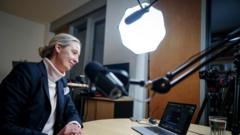Elon Musk, the world's wealthiest individual, has stirred the political pot in Germany following a 74-minute live chat with Alice Weidel, the frontwoman of the far-right Alternative für Deutschland (AfD) party, which received significant backlash. The conversation, which traversed diverse subjects ranging from energy policy and bureaucracy to Adolf Hitler and the meaning of life, saw Musk unequivocally encouraging German citizens to support the AfD in upcoming elections, marking a significant moment of endorsement for the party amidst ongoing scrutiny.
The event, streamed on Musk's X platform, served not only as a forum for Weidel to promote her political ideals but also as a platform that could reach a broader, international audience. Weidel, firmly asserting her party’s conservative and libertarian ideology, claimed mainstream media has unduly labeled the AfD as extremist. However, various factions within the party have been designated as right-wing extremist by German authorities, a characterization that remains deeply contentious.
During the interview, Weidel controversially claimed that Adolf Hitler was a "communist" and distanced him from conservatism or libertarian views. Her assertions — that Hitler was an "antisemitic socialist" — both startled and prompted laughter from Musk as they shared commentary on Germany's labyrinthine bureaucracy, the nation’s withdrawal from nuclear energy, and the cultural phenomenon of "wokeness."
Additionally, Musk’s engagement in German politics has ignited criticism regarding foreign influence in national elections, especially in light of a snap federal election set for February 23, where the AfD is presently polling second. While other parties have resolutely refused to collaborate with the AfD, Musk’s optimism for Weidel as a "leading candidate" to head Germany underscores his bold stance. Musk justified his involvement by referencing his substantial investments in Germany, including a notable Tesla factory near Berlin.
German Chancellor Olaf Scholz, aware of Musk’s provocative remarks, emphasized a level-headed approach to the billionaire's interference, stating he is "staying cool" about the situation while other European leaders have criticized Musk's involvement. As the political landscape shifts, Musk’s influence continues to provoke dissent and discussion surrounding the boundaries of political engagement by high-profile international figures.



















